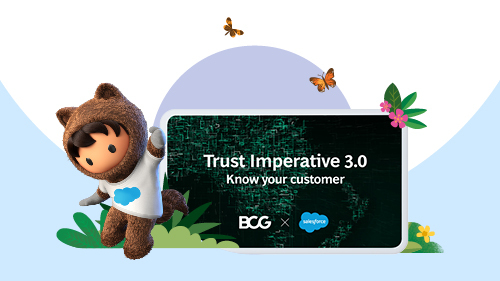


New research from Salesforce and Boston Consulting Group, Trust Imperative 3: Know Your Customer, indicates that citizens’ appetite for personalised, proactive government services is hardly a one-off feature of the pandemic. In fact, Australians and New Zealanders are well and truly ready for the next evolution in service delivery. And that means it’s time for agencies to rethink their role beyond ‘custodians of data.’
Previous Trust Imperative reports in 2020 and 2021 established the link between citizen trust and improved digital service delivery, as well as permission to personalise. But this latest research confirms what will be required to really meet customer expectations — 91% of respondents in Australia and New Zealand say they’re willing to share data with government so it can deliver tailored services.
It marks an important next step for agencies, one that can help them find new efficiencies, understand their stakeholders better, and build responsive and resilient government for the long term.
This data is what brings to life the quality of services and experiences necessary to meet citizens’ expectations. The more agencies understand about their customers, the greater their ability to tailor services to circumstances and needs. It is important to note that understanding their customers better doesn’t mean knowing everything about them, but rather the information that is necessary to deliver the best service the particular agency is tasked to deliver.
To understand how and why agencies will need to move from simply being custodians of data to entities that also contextualise information, it’s worth considering BCG’s maturity stages of data sharing:
Tapping into the ‘trust flywheel’, tailoring services to customers’ unique needs, and building greater government efficiencies will require a move from Level 1 to Level 2 — and the research suggests that a significant portion of government customers are ready for such a move.
The research behind this report uncovers a critical and surprising trend: that the majority of customers are willing to go beyond sharing only what is essential to comply with government requirements and instead provide access to relevant data or any data at all if it makes their lives easier. This is a significant indication that government has the green light to move into a new level of data-sharing maturity to meet heightened customer expectations.
But what do those expectations look like, exactly? The research reinforces that citizens continue to want personalised services and proactive delivery — 84% of Australians and New Zealanders are seeking personalised services delivered proactively. These expectations have hardly budged since the beginning of the COVID-19 pandemic, suggesting that this is government’s new reality rather than a temporary phase.
Specifically, more than one in three expect government to engage them with services based on their profile and circumstances. And, one in five people want government to proactively sign them up for services they’re entitled to, a 75% increase since last year.
The research is clear: government customers are willing to share information in exchange for the level of personalisation and proactivity they expect. This requires moving into the next stage of data-sharing maturity in an environment of increased focus on the economic sustainability of government programmes.
Fortunately, these imperatives aren’t contradictory — in actuality, they go hand-in-glove. Customers’ willingness to share data can help agencies re-use and re-contextualise information in ways that facilitate service delivery improvement, creating new efficiencies and helping agencies build more resilient government.
The digitisation of services that meet customer needs is an opportunity to provide public sector employees with the tools they need to deliver greater impact and receive greater job satisfaction. Governments who adopt greater maturity levels of data-sharing have the potential to support their employees to become informed experts, equipping them with the right information and insights to deliver better outcomes while simultaneously increasing employee engagement and wellbeing.